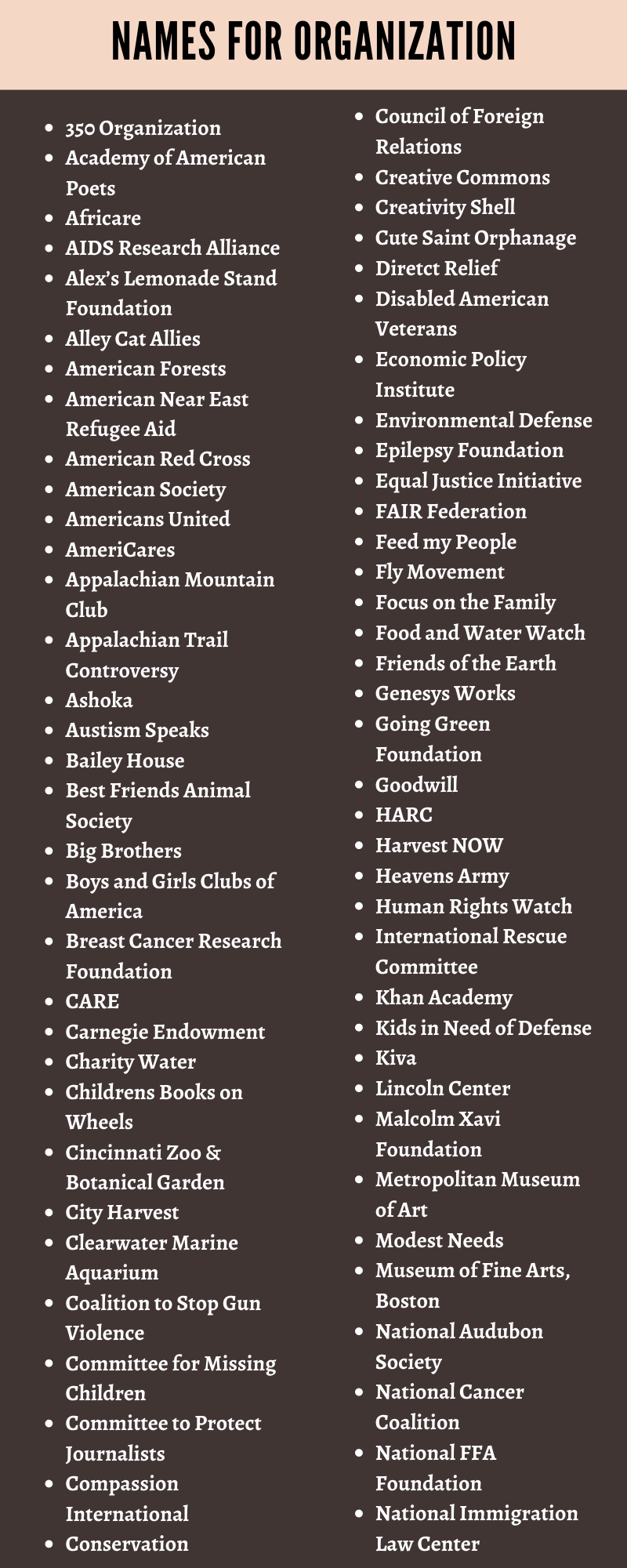Last Updated on March 26, 2024 by Mubashir Rafique
In this post, we’re excited to share with you some creative and captivating names that can be used for organizations of all kinds. As William Shakespeare once said, “What’s in a name? That which we call a rose by any other name would smell as sweet.” Names have the power to evoke emotions, convey meaning, and leave a lasting impression. So, let’s dive into this extensive list of organization names that will surely inspire you!
As a Naming Specialist with three years of experience, I’ve had the privilege of working in the fascinating field of naming. From brainstorming names for businesses to creating unique monikers for fantasy characters, I’ve honed my skills in finding the perfect names that capture the essence and purpose of an entity. With my expertise, I’m thrilled to present you with a compilation of names that are sure to spark your imagination and help you find the ideal name for your organization.
In this article, you’ll discover a treasure trove of unique and captivating names for organizations. Whether you’re starting a new company, establishing a nonprofit, or even naming a club or team, we’ve got you covered. Each name on this list has been carefully curated to provide you with a diverse range of options. So, get ready to be inspired as you explore these extraordinary names and find the perfect fit for your organization’s identity.
Names for Organization

Here are some cool and catchy organization names to inspire you:
- The Sunshine Kids
- Disabled Kids Organization
- The Trevor Project
- Humane Society
- Room to Read
- Safe Kids Worldwide
- Pro-Youth Foundation
- Project Alert
- New Horizons
- Nourishment for the Needy
- Girls Inc.
- Global Fund for Women
- Global Giving
- Donors Choose
- Dream Alive Center
- Dress for Success
- College Forward
30 Names for Organization with Meanings
- Elysium Foundation: Elysium refers to a state of perfect happiness or paradise, symbolizing the organization’s aim to create a better world.
- Harmonia Alliance: Harmonia represents harmony and unity, indicating the organization’s mission to promote peace and cooperation.
- Solace Initiative: Solace means comfort and consolation, reflecting the organization’s focus on providing support and relief to those in need.
- Luminary Society: Luminary refers to a person who inspires or enlightens, representing the organization’s dedication to fostering leadership and knowledge.
- Serenity Coalition: Serenity signifies a state of tranquility and peace, highlighting the organization’s commitment to creating a calm and harmonious society.
- Empowerment Network: This name suggests the organization’s mission to empower individuals and communities, fostering self-confidence and personal growth.
- Phoenix Rising Foundation: The phoenix is a mythical bird that symbolizes rebirth and resilience, reflecting the organization’s focus on overcoming challenges and promoting transformation.
- Catalyst Collective: Catalyst refers to a person or thing that sparks change or progress, indicating the organization’s role in driving positive social transformation.
- Nexus Alliance: Nexus represents a connection or link, symbolizing the organization’s aim to bring together diverse groups and forge strong partnerships.
- Hope Renewal Project: This name conveys the organization’s mission to renew hope and restore optimism in individuals facing adversity.
- Renaissance Society: Renaissance refers to a period of cultural and intellectual rebirth, signifying the organization’s commitment to fostering creativity and innovation.
- Ascend Foundation: Ascend means to rise or climb, suggesting the organization’s goal of uplifting individuals and communities to reach their full potential.
- Resilience Circle: Resilience denotes the ability to bounce back from adversity, underscoring the organization’s focus on building strength and overcoming challenges.
- Empathy Network: This name suggests the organization’s dedication to promoting empathy and understanding among individuals and fostering a more compassionate society.
- Envision Tomorrow: Envision signifies the act of imagining or visualizing, representing the organization’s focus on creating a brighter and more sustainable future.
- United Front Initiative: United Front conveys the idea of solidarity and collaboration, reflecting the organization’s commitment to working together for a common cause.
- Compassion Foundation: Compassion refers to showing kindness and understanding, reflecting the organization’s mission to promote empathy and support for others.
- Insight Institute: Insight represents deep understanding or perception, highlighting the organization’s dedication to fostering knowledge and enlightenment.
- Dream Builders Society: This name suggests the organization’s focus on turning dreams into reality by providing resources and support for individuals to achieve their goals.
- Bridge to Progress: A bridge signifies a connection or link between two points, symbolizing the organization’s role in facilitating progress and positive change.
- Momentum Coalition: Momentum refers to the force or power gained by movement, indicating the organization’s commitment to driving forward and creating momentum for change.
- Renewal Endeavor: Renewal represents the act of restoring or revitalizing, reflecting the organization’s focus on initiating positive change and transformation.
- Insightful Minds: This name conveys the organization’s emphasis on fostering wisdom, critical thinking, and intellectual growth.
- Equilibrium Society: Equilibrium represents a state of balance and harmony, symbolizing the organization’s goal of creating a society where all aspects coexist peacefully.
- Hope Springs Initiative: Hope Springs signifies the emergence of hope or positive change, suggesting the organization’s commitment to bringing about a brighter future.
- Catalyst for Equality: This name highlights the organization’s role in driving progress and promoting equal rights and opportunities for all.
- Beacon Project: A beacon is a guiding light or signal, symbolizing the organization’s mission to provide guidance, support, and inspiration to individuals and communities.
- EmpowerED: This name combines the words “empower” and “education,” emphasizing the organization’s focus on empowering individuals through knowledge and learning.
- Unity Force: Unity represents the state of being united or joined together, while force implies strength and power. This name reflects the organization’s mission to harness the strength of unity for positive change.
- Prosperity Alliance: Prosperity signifies wealth, success, and well-being, and alliance refers to a partnership or coalition. This name suggests the organization’s aim to promote prosperity and collaboration among individuals and communities.
Cool Organization Names

Below are some cool organization names that you will like for sure:
- Cancer Care
- Carbon Fund
- Action Institute
- Acumen Fellowship
- Adopt a Platoon
- Table 6 Productions
- The Conference Connect
- The Event Concierge
- Coastyle Events
- Corporate Affairs
- Creative Life Planning
- Humanist Association
- Jewish World Service
- Kidney Fund
- Angel Reach
- Animal Legal Defense Fund
Organizing Business Names

Following are the best organizing business names that you will like:
- Catholic Relief Services
- Center for Biological Diversity
- Center for Responsive Politics
- Water for the Poor
- Child Care Services
- Feed The Poor
- Chicago Men’s Club
- Children’s Disaster Services
- Do Something
- Doctors Without Borders
- Graceful Aging Club
- Green Peace
- Guttmacher Institute
- Houston Endowment
- Houston Food Bank
Association Names

Here are some cool and catchy association names for you:
- Ocean Conservancy
- Oceana
- Partners in Health
- Risen Dead
- Ronald McDonald
- Seniors Coalition
- Sleepy Hollow
- Smithsonian Institution
- The Impact Foundry
- The Museum of Modern Art
- Women Employed
- World Medical Relief
- World Resources Institutes
- Wreaths Across America
- YES to YOUTH
- Sundance Institute
- Teach for America
Clever Organization Names

Below are some creative and clever organization names for you:
- Making Memories
- One-of-a-Kind Creations
- For the Poor
- They Need Help
- Helping Hands
- For the Love of Sports
- Purple Fox
- Rose Canyon
- Sapphire Stars
- The Turquoise Elephant
- Silver Stag
- Cardinal & Pine
- White Cotton Tee
- Corduroy & Satin
- Log Cabin
- Pink Plaid
Funny Organization Names
Here are some funny organization names that you will like:
- Cambridge Avenue
- Morningside Heights
- Greenleaf Court
- Winthrop Park
- Victoria Glen
- River Stone
- The Watercolor
- Pink Crescent Moon
- Dewdrops & Sunlight
- Ready Home
- Green House
- Decluttering Burst
- Complete Look
- House Spic
- Base Fresh
- Place Tonic
Unique Names For Organization
- Innovus Solutions
- Elysian Ventures
- Quantum Enterprises
- Novus Alliance
- Serendipity Strategies
- Ethereal Innovations
- Axiom Collective
- Apex Ventures
- Paragon Solutions
- Synergy Dynamics
- Avant-Garde Enterprises
- Enigma Industries
- Pinnacle Ventures
- Solstice Innovations
- Vertex Alliance
- Euphoria Holdings
- Catalyst Consortium
- Epiphany Solutions
- Nirvana Enterprises
- Ingenium Ventures
- Esprit Industries
- Zenith Innovations
- Metamorphosis Holdings
- Evolve Collective
- Stellar Strategies
- Epoch Enterprises
- Equinox Solutions
- Genesis Ventures
- Quintessence Consortium
- Ascent Innovations
Islamic Names For Organization
- Safa Foundation
- Barakah Consulting
- Ihsan Trust
- Rahma Ventures
- Noor Enterprises
- Azizah Solutions
- Taqwa Holdings
- Khalifa Consortium
- Mahabbah Enterprises
- Hayat Strategies
- Noura Investments
- Hikmah Solutions
- Inaya Ventures
- Khairat Collective
- Amanah Holdings
- Falah Enterprises
- Ilm Alliance
- Subhan Enterprises
- Rida Ventures
- Zikr Solutions
- Firdaus Investments
- Taqdeer Holdings
- Sadaqah Consortium
- Sabr Solutions
- Qadr Ventures
- Jameel Enterprises
- Salamah Alliance
- Zuhd Holdings
- Sirat Collective
- Tawakkul Ventures
Team Names For Organization
- Invincible Squad
- Phoenix Warriors
- Vanguard Squad
- Elite Force
- Alpha Alliance
- Fusion Fighters
- Dynamo Squad
- Quantum Warriors
- Apex Battalion
- Radiant Squad
- Empyrean Force
- Titan Brigade
- Elysium Warriors
- Omega Squad
- Astral Battalion
- Thunderbolt Squad
- Seraphim Force
- Nova Alliance
- Blaze Battalion
- Hyperion Squad
- Ascendant Force
- Nebula Warriors
- Aurora Alliance
- Stormbringers
- Supernova Squad
- Valiant Battalion
- Phoenix Rising
- Celestial Force
- Thunder Legion
- Infinite Squad

How to Name Your Organization
Gone are the days when we use to start a business without facing any competition. Today, in order to succeed, you need to create an amazing and strong branding strategy to succeed in branding your name.
The competition has increased to a level that if you don’t pay attention to all the small factors in business, you may fail. Creating a catchy and creative business name is one of them. You have to pay attention to it.
If we look around us, we see both successful businesses and those who failed badly. We have the reasons for the failure of these businesses. One of the most common reasons is having a business name that isn’t relevant to the business.
When you don’t know how to name your organization, the same thing can happen to you too. But don’t worry we are here to help you.
Here are some tips that will help you name your organizations:
1. Brainstorm organization names ideas.
The first thing is to brainstorm name ideas and suggestions.
Write down all the names that are popping up in your head. Start playing with different words related to your organization and start writing them too.
After that, you will have more than twenty name ideas and suggestions.
The second thing is to get ideas from friends and family. It would be great if you meet someone who is already in the business that are you looking forward to starting. Such people can give you some amazing and creative names for organizations.
Thirdly, you can try organization name generators. An online search will give you a bunch of generators that will help you.
You need to ask yourself these questions to make your mind clear:
- What kind of organization am I going to start?
- Who will be my clients and who will buy our services?
- What’s our specialty? Why will we be famous?
Once your mind is clear about things, you will find it really easy to name your organization.
2. Keep it short, simple, and memorable.
Short and simple names do better than long boring names.
In fact, if we take a look at the most successful businesses around us, we will come to know that all of them have names that are short, simple, and memorable.
When your business name is memorable, you get returning customers. And, believe me, returning customers are the best. These are the people that share a good opinion about your services. They recommend your products to other people too.
3. Finalize your business name.
Your final business name should be catchy. Following are the things you can do:
- Add your own name to your organization name.
- Consider adding location names.
- Don’t go above three words.
- It should sound good when said aloud.
4. Understand Your Organization’s Identity
To begin the process of choosing a good name, it is crucial to have a clear understanding of your organization’s identity. Start by defining your vision and mission—what are your organization’s core values and goals? Understanding these elements will help you create a name that aligns with your organization’s purpose.
Additionally, identify your target audience and market. Who are your customers or clients? What are their demographics, preferences, and needs? This knowledge will guide you in selecting a name that resonates with your intended audience.
5. Consider the Branding Elements
A good name should reflect your organization’s values and culture. It should convey the essence of what you stand for. Consider the emotions and associations you want your name to evoke. Do you want to be seen as innovative, reliable, or eco-friendly? Aligning your name with your desired brand image will help you create a cohesive and authentic identity.
Furthermore, aim to create a memorable and unique image with your name. In a crowded marketplace, a distinct name can make your organization stand out. Avoid generic terms or clichés and strive for originality. A unique name will capture attention and pique curiosity, making it easier for people to remember and recognize your organization.
6. Research Existing Names and Trademarks
Before settling on a name, it is essential to conduct thorough research to ensure it is available and legally viable. Start by conducting a comprehensive trademark search to avoid infringing on existing trademarks. This will help you avoid legal issues down the line.
Additionally, check the availability of domain names associated with your potential organization name. A consistent online presence is crucial in today’s digital landscape. Securing a domain name that aligns with your chosen name will enhance your organization’s online visibility and accessibility.
7. Brainstorming and Idea Generation
Once you have a clear understanding of your organization’s identity and have completed initial research, it’s time to dive into brainstorming and idea generation. Establish naming criteria that reflect your organization’s values, target audience, and branding goals. These criteria will serve as a framework to evaluate and narrow down potential names.
Encourage collaborative brainstorming sessions with your team or stakeholders. Different perspectives and ideas can spark creativity and generate a wider range of options. Make sure to create a supportive environment that encourages open-minded thinking and constructive feedback.
Utilize mind-mapping techniques to visually explore various associations, concepts, and related words. This method can help you generate new ideas and connections that may lead to unique and compelling name options for your organization.
8. Evaluate and Narrow Down the Options
Once you have a list of potential names, it’s time to evaluate and narrow down your options. Assess the relevance and resonance of each name. Does it align with your organization’s identity and goals? Does it evoke the desired emotions and associations? Eliminate any names that do not meet these criteria.
Consider linguistic and cultural implications when evaluating the names. Ensure that your chosen name does not have any unintended negative connotations or offensive meanings in different languages or cultures. It’s crucial to have a name that can be easily pronounced and understood by your target audience, regardless of their native language.
9. Conducting a Legal Check and Finalizing the Name
After narrowing down your options, it’s essential to conduct a legal check to ensure the name is available for use and does not infringe on any existing trademarks. Consult with legal professionals specializing in intellectual property law to ensure compliance and protection of your organization’s name and brand.
Once you have cleared the legal considerations, it’s time to finalize the name for your organization. Ensure that the name resonates with your team and stakeholders and aligns with your organization’s identity and goals. Remember, this name will become a cornerstone of your brand, so it’s essential to make a well-informed decision.
Conclusion
Choosing the perfect name for your organization is a crucial step in establishing its identity and creating a lasting impression. We have compiled the ultimate list of names for organizations to provide you with a wide range of options and inspire your creative journey.
Remember, a great organization name should be memorable, representative of your mission or values, and resonate with your target audience. Consider brainstorming sessions with your team, conducting market research, and exploring different naming techniques to find the ideal fit.
Whether you’re starting a nonprofit, a tech startup, or a community group, this comprehensive list offers a variety of choices, from catchy and modern to classic and timeless. With careful consideration and creativity, you can find a name that captures the essence of your organization and sets you up for success in the long run.
Frequently Asked Questions about Names for Organizations
1. What are the key considerations when choosing a name for an organization?
When choosing a name for an organization, there are several important factors to consider. These include:
- Relevance: Is the name aligned with the organization’s purpose, mission, and values?
- Memorability: Will the name be easy for people to remember and recall?
- Uniqueness: Is the name distinctive and not easily confused with other organizations?
- Accessibility: Can the name be easily pronounced and spelled by the target audience?
- Domain Availability: Is the corresponding domain name available for the organization’s website and email addresses?
- Legal considerations: Does the name comply with trademark laws and regulations in the relevant jurisdiction?
2. How can a name reflect an organization’s brand identity?
A well-chosen name can effectively reflect an organization’s brand identity. Consider the following strategies:
- Descriptive names: Names that directly convey what the organization does or its core values can help establish a clear brand identity. For example, “EcoSolutions” for an environmentally focused organization.
- Evocative names: Names that evoke emotions or create a specific image can contribute to a unique brand identity. For instance, “InspireNow” for an organization focused on motivation and personal development.
- Symbolic names: Names that use symbols or metaphors related to the organization’s mission or purpose can enhance brand identity. An example could be “Phoenix Rising” for an organization working on disaster relief and recovery.
- Abstract names: Names that are more abstract or coined words can create a distinct brand identity by being memorable and open to interpretation. Consider “Zyntech” for a technology-oriented organization.
3. How important is simplicity in an organization’s name?
Simplicity is crucial when it comes to an organization’s name. A simple name has several advantages:
- Ease of recall: A simple name is easier for people to remember, increasing the chances of being top-of-mind when they need the organization’s services or support.
- Ease of communication: A simple name is easier to pronounce and spell, making it effortless for others to share and refer to the organization.
- Versatility: A simple name can be more adaptable across various communication channels, including online platforms, social media, and physical signage.
- Timelessness: Simple names tend to age well and have a longer shelf life compared to trendy or complex names.
4. Should an organization’s name be descriptive or abstract?
The choice between a descriptive or abstract name depends on the organization’s goals and target audience. Consider the following aspects:
- Descriptive names: These names provide clarity about the organization’s purpose, services, or values. They can be beneficial when establishing immediate recognition and understanding, especially for organizations targeting a specific industry or niche.
- Abstract names: These names offer more flexibility and room for interpretation. They can be memorable, distinct, and adaptable to a wide range of activities and sectors. Abstract names often require additional branding efforts to communicate the organization’s purpose or values effectively.
5. How can I ensure my organization’s name is legally available?
To ensure your organization’s name is legally available, follow these steps:
- Conduct a name search: Start by searching existing business directories, public records, and trademark databases to identify any potential conflicts.
- Consult a trademark attorney: Engage a trademark attorney to conduct a comprehensive search and assess the availability of the name.
- Register a trademark: If the name is clear, consider registering it as a trademark to protect it from infringement and secure exclusive rights.
- Check domain name availability: Ensure the corresponding domain name is available for your organization’s website by conducting a domain search through domain registration services.
6. Should I consider international implications when choosing an organization’s name?
Considering international implications is important when choosing an organization’s name, especially if there are plans for global expansion or if the organization operates in an international context. Here are some factors to keep in mind:
- Cultural sensitivity: Ensure that the name does not carry any unintended negative connotations or offensive meanings in other languages or cultures.
- Pronunciation and translatability: Consider how easily the name can be pronounced and understood in different languages, as well as its translatability.
- Trademark conflicts: Conduct a thorough search to identify any potential trademark conflicts in the international markets where the organization intends to operate.
- Domain Availability: Check the availability of the corresponding domain name in different country-specific top-level domains (TLDs) if the organization plans to have a global online presence.
7. Can a name change negatively impact an organization’s reputation?
While a name change can be necessary under certain circumstances, it can have both positive and negative impacts on an organization’s reputation. Here are some potential considerations:
- Brand recognition: If the organization has an established brand identity, a name change may initially confuse or disorient stakeholders, impacting brand recognition.
- Perception of instability: Frequent name changes can create a perception of instability and lack of focus, potentially eroding trust among stakeholders.
- Rebranding costs: Changing a name requires updating various assets such as signage, marketing materials, and online presence, which can be costly.
- Positive repositioning: A well-executed name change can also signal a fresh start, repositioning the organization in a more positive light and attracting new audiences.
8. How can I test the effectiveness of an organization’s name?
To test the effectiveness of an organization’s name, consider the following approaches:
- Focus groups and surveys: Gather feedback from target audiences through focus groups or online surveys to assess their perception of the name, its memorability, and relevance.
- A/B testing: Conduct A/B testing by presenting different versions of the name to a sample audience and measuring their responses and preferences.
- Brand association exercises: Use brand association exercises to understand the associations and emotions evoked by the name among stakeholders.
- Professional consultation: Seek the expertise of branding professionals or market research experts who can provide objective insights and recommendations based on industry knowledge and best practices.
9. What are some common naming pitfalls to avoid?
When choosing a name for an organization, be cautious of these common naming pitfalls:
- Obscurity: Avoid names that are overly complex, difficult to pronounce, or lack clarity about the organization’s purpose.
- Trademark infringement: Conduct thorough trademark searches to ensure the name doesn’t infringe upon existing trademarks, which could lead to legal issues and rebranding costs down the line.
- Lack of scalability: Consider the future growth and expansion plans of the organization. Choose a name that can accommodate future endeavors and doesn’t limit the organization’s scope.
- Trendiness: Be cautious of trendy names that may quickly become outdated and lose their relevance.
- Insensitive or controversial connotations: Carefully assess potential cultural or linguistic interpretations to avoid names that may be perceived as offensive, insensitive, or controversial.
10. Can I modify an existing word or phrase to create an organization’s name?
Modifying an existing word or phrase to create an organization’s name can be a creative approach. However, it is essential to consider the following:
- Trademark considerations: Check for any existing trademarks or intellectual property rights associated with the modified word or phrase to avoid potential legal issues.
- Clarity and distinctiveness: Ensure that the modified name remains clear, distinct, and easily distinguishable from the original word or phrase.
- Relevance: Evaluate whether the modified name effectively reflects the organization’s purpose, values, or services.
- Memorability: Consider if the modified name is still memorable and easy to recall for the target audience.
Related:
